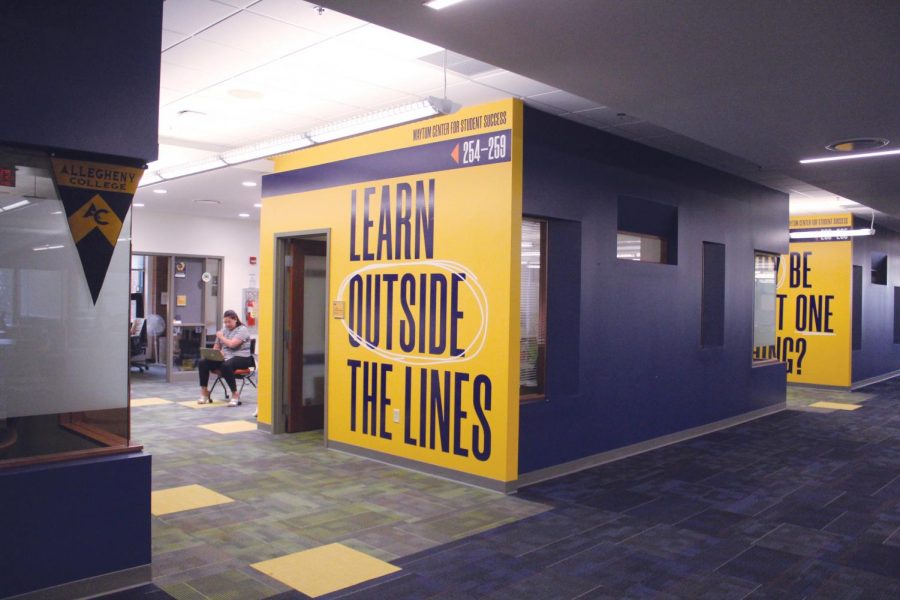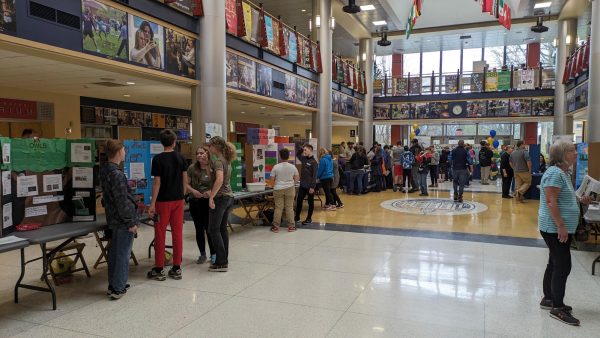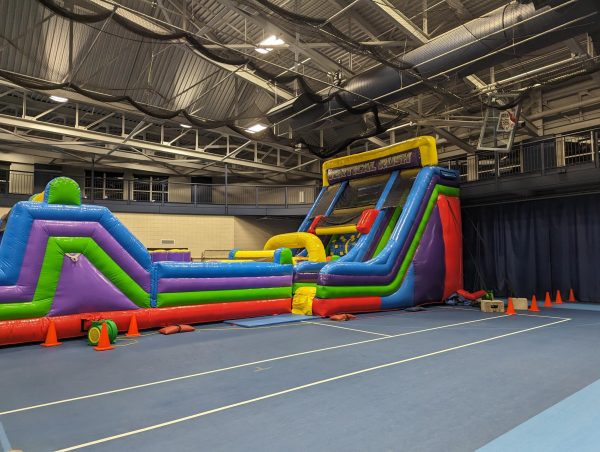Gateway and Learning Commons merge into Maytum Center
SAMI MIRZA/THE CAMPUS The walls of the former Gateway and Learning Commons — the section of the library now known as the Maytum Center for Student Success — have been painted bright blue gold to coincide with the college’s re-branding.
If you have been to the Lawrence Lee Pelletier Library this semester, you may have noticed the left side of the collaborative floor has undergone some changes, the displays of pre-professional packets and sheets of advice have disappeared. The walls are now blue and gold instead of the orange, yellow and green they were previously. The source for these changes is the reorganization of the Learning Commons and Gateway into the new Maytum Center for Student Success. The Learning Commons was a host for various programs to ensure all students could succeed academically, while The Gateway focused on preparation for future careers. The previous two departments have merged to form a more cohesive space for students to seek advice from.
While many of the resources in the Maytum Center existed prior to the reorganization, the class dean system is brand new. Class deans are advisors students can meet with to seek advice specific to their year. For example, the first-year dean may focus on helping students integrate into the college environment, while second-year deans will focus on helping students declare their major and minor. Niki Fjeldal, the first-year dean, clarified the goal of this system.
“The idea is for it to be about holistic student success,” Fjeldal said. “I’m that one-stop-shop … regardless of what’s happening they can come here and I can either help them with what they need help with, or I can connect them to the bridge they need to help them through that process.”
Fjeldal has developed a few new projects on campus so far. She is visiting FS 101 classes to give presentations on time management, stress management, study skills and developing a four-year plan. Due to so many second-years being on campus for the first time, Fjeldal has also opened up the Navigator program for sophomores for this year, and initiated drop-in hours with the Navigator program. The Navigator program is a system where an underclassman is paired with an upperclassman who gives them advice about adjusting to college life. Fjedal has also started Wellness Wednesdays, where students can drop by the campus center to play games, make crafts, eat lunch and socialize with one another.
The class dean structure is still being developed. The second-year dean and third/fourth-year dean are in the process of being hired.
The root of these changes is President Hilary Link’s larger vision of restructuring administrative positions. Link hopes her strategic plan will make the best student experience the average student experience.
Jennifer McDonough, academic advisor and life coach who works with the Maytum Center said the new center will help achieve the goals of Link’s plan.
“I think that (Link) wanted to find the most effective way to streamline all the different programs and departments,” McDonough said. ”We have to make sure that we’re all working together in ways that make sure any student who has any sort of need for resources is found, and that those resources are given to them. We don’t want any students falling through the cracks.”
Dean for Student Success Ian Binnington also asserted that President Link hopes the reorganizing will emphasize Allegheny’s strengths. This includes the major and minor requirement creating distinct combinations and allowing students to begin research and internships in their fields of study early on.
Binnington elaborated on some other changes that have occurred within the new Success Center.
“What we have added is approximately half of what used to be the Allegheny Gateway,” Binnington said.
This includes pre-professional advising, International Education- which assists students from other countries, and Global Education- which provides students with study away programs. Other aspects of The Gateway — such as Civic Engagement, Career Education and the Center for Political Participation — did not become integrated into the Maytum Student Success Center. These offices are now under the direction of the Office of Institutional Advancement.
Binnington said that this reorganization helps prioritize not only academics but also postgraduate opportunities.
“We’re not recruiting students, we’re recruiting alumni,” Binnington said. “We’re not educating students for a profession or job, we’re educating students for life.”
Binnington and the new Student Success Center, operate with the belief that when institutions use conventional advising models that focus only on academics, they end up ignoring other important aspects of a student’s college career.
“A significant part of the learning in college goes on outside of the classroom,” Binnington said. “Social integration and social engagement is also important. Students who don’t find friends, students who don’t feel included, students who don’t feel part of the community are less satisfied, are less often successful.”
The Maytum Center for Student Success is still evolving. Aside from the class dean system that is still in progress, staff are open to feedback so they can continue to improve the programs on campus.
“Our goal is that if we have a model that works, we repeat that model the year after,” Binnington said. “It will be an evolution — it won’t be a revolution — it will be an evolution of what’s gone before.”

Sami Mirza is a senior from many different places. He is majoring in International Studies with a focus on the Middle East and North Africa and minor in...












